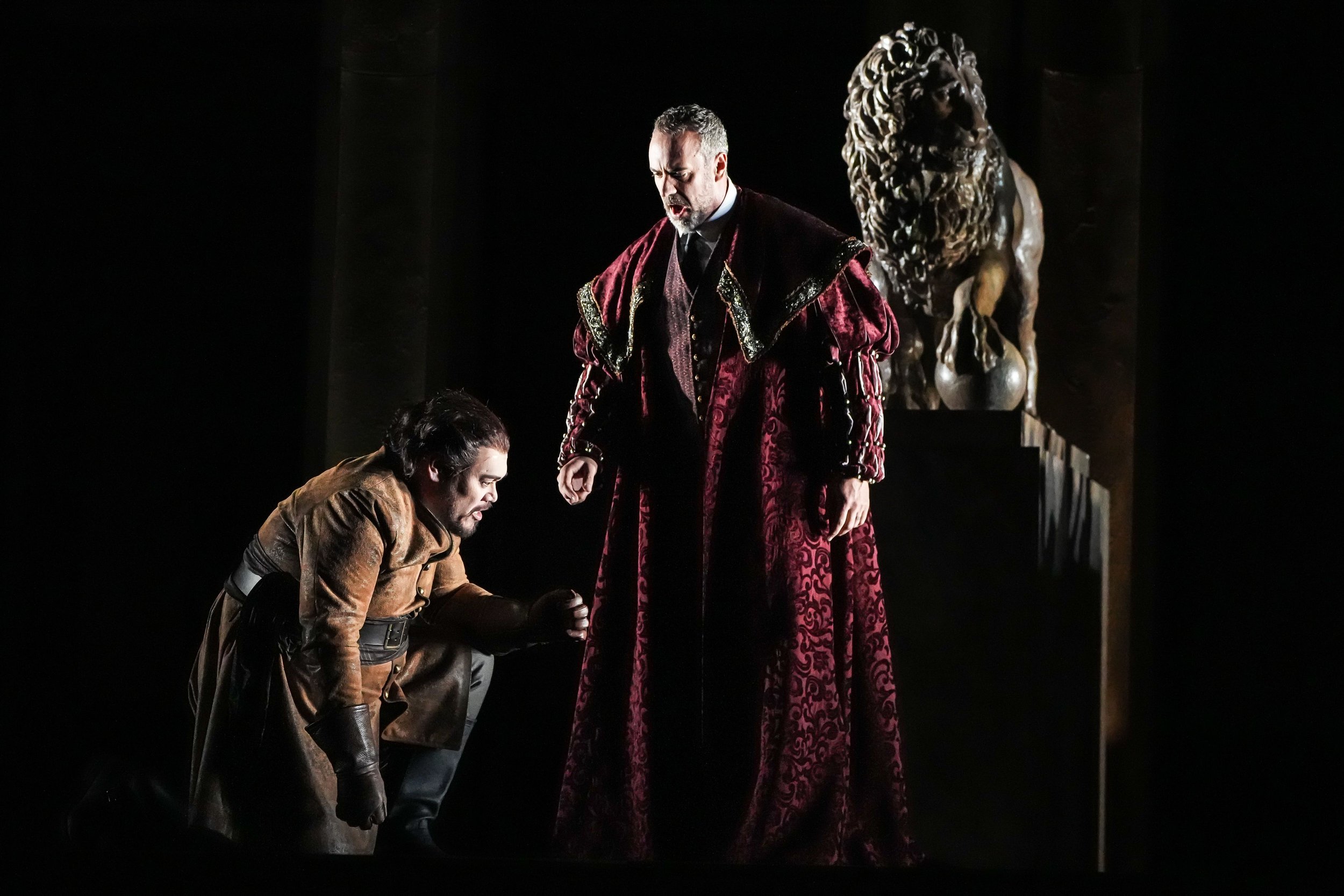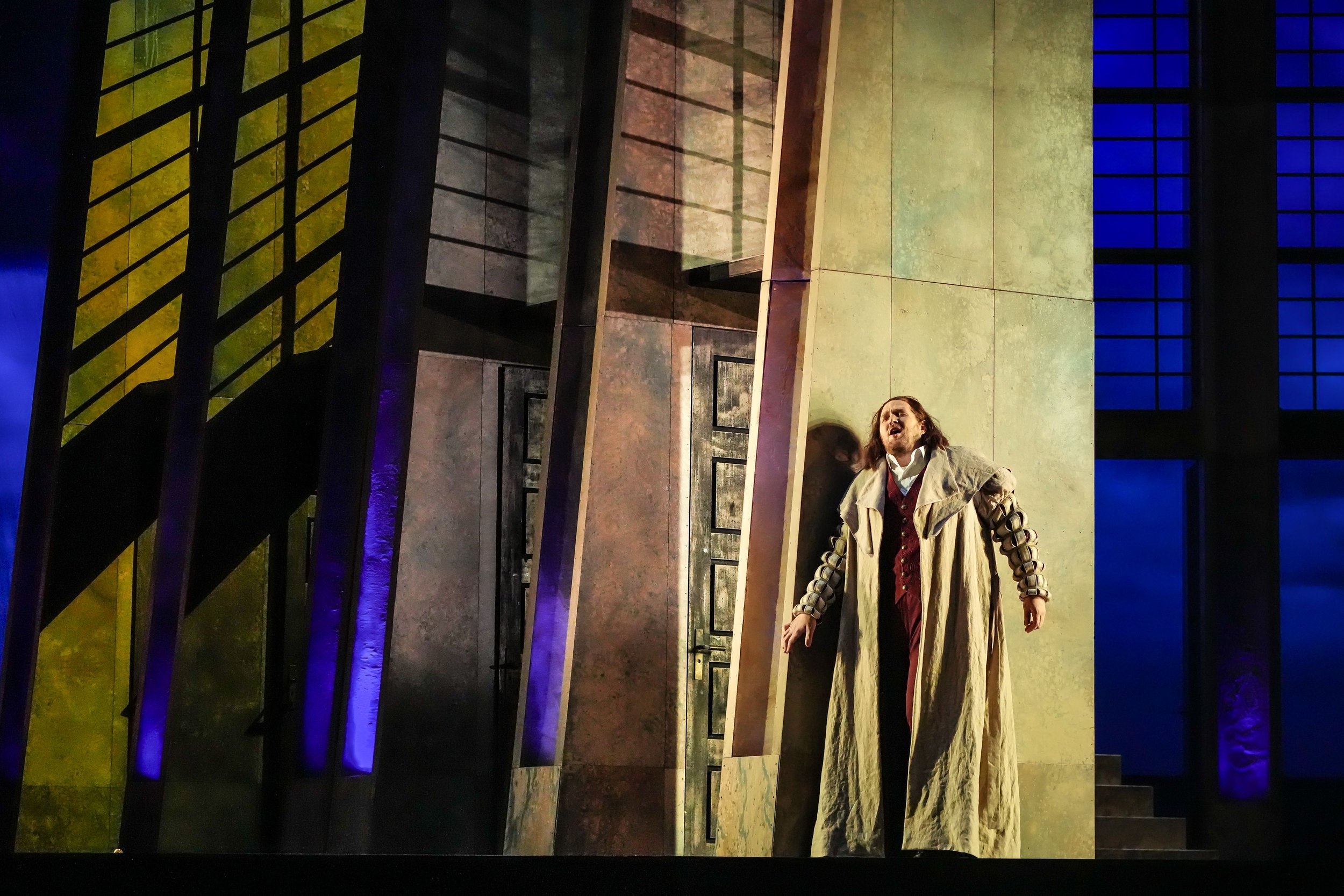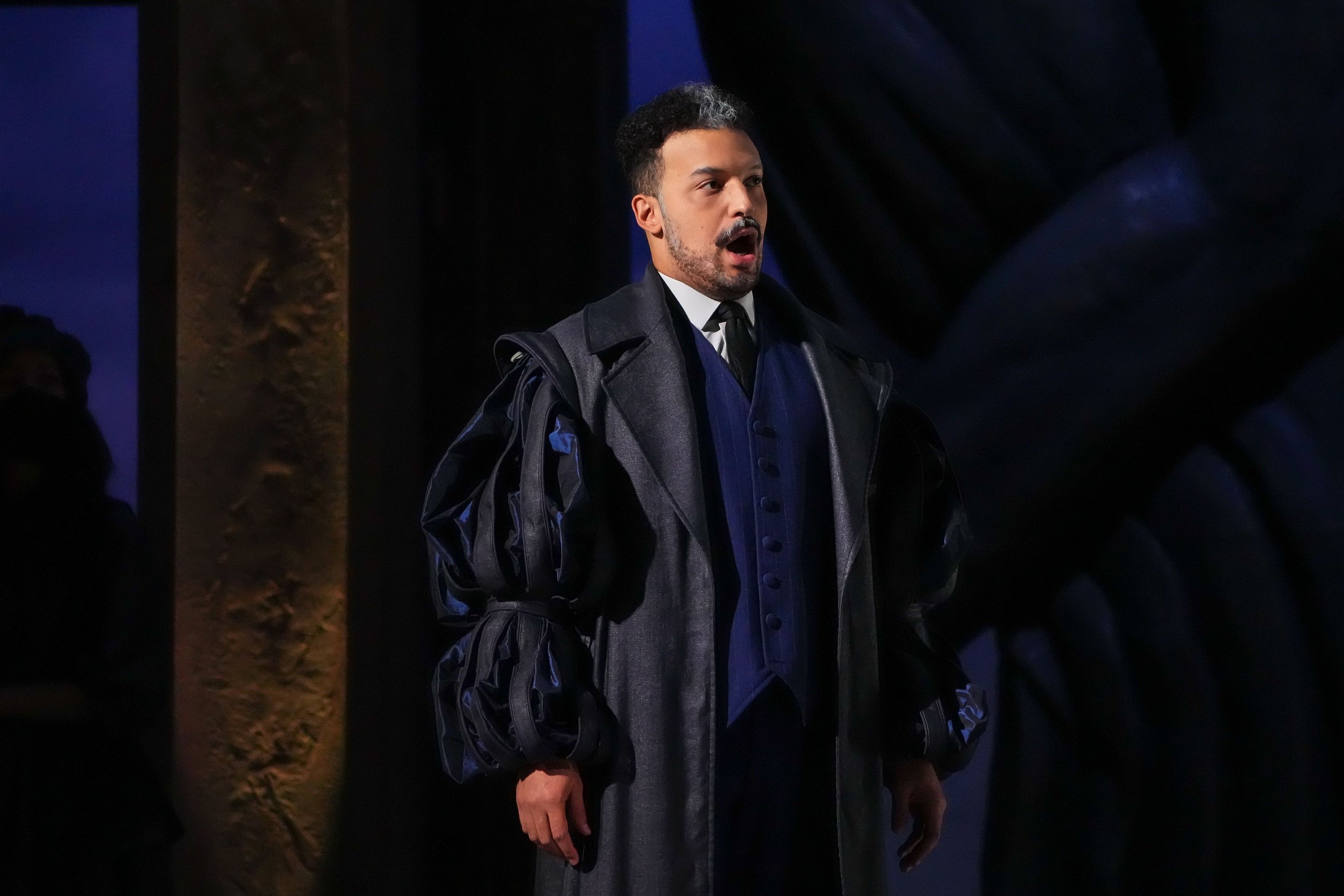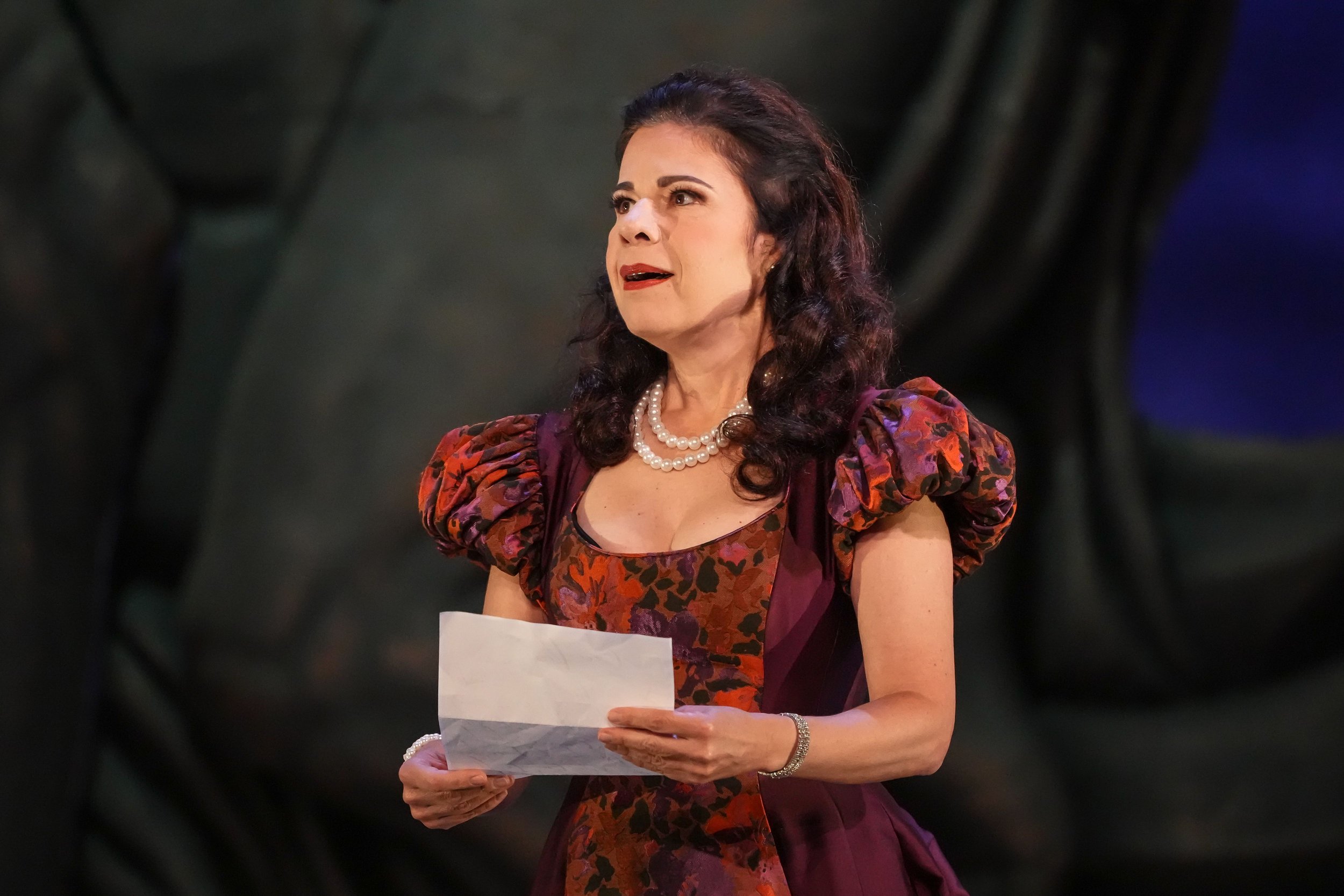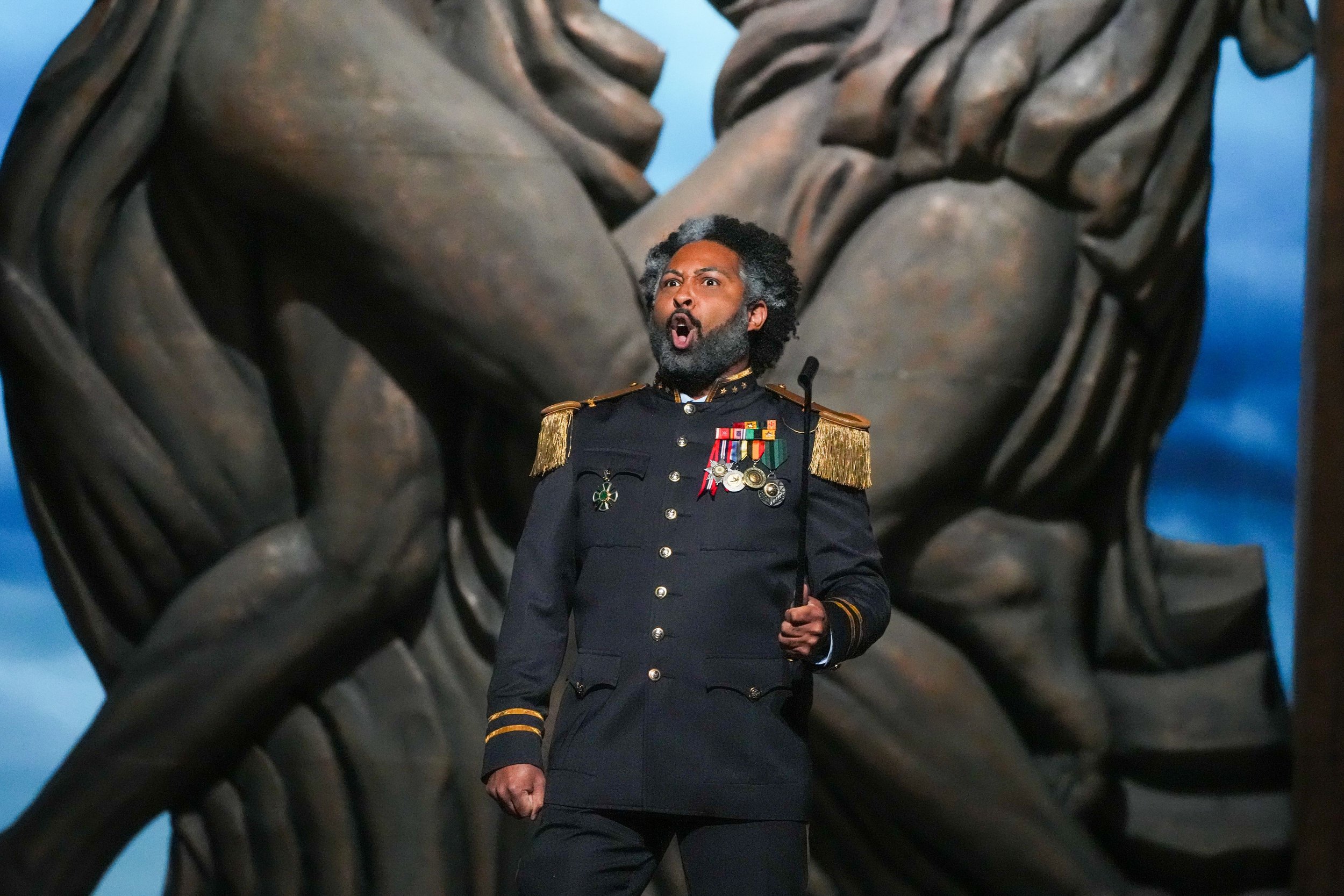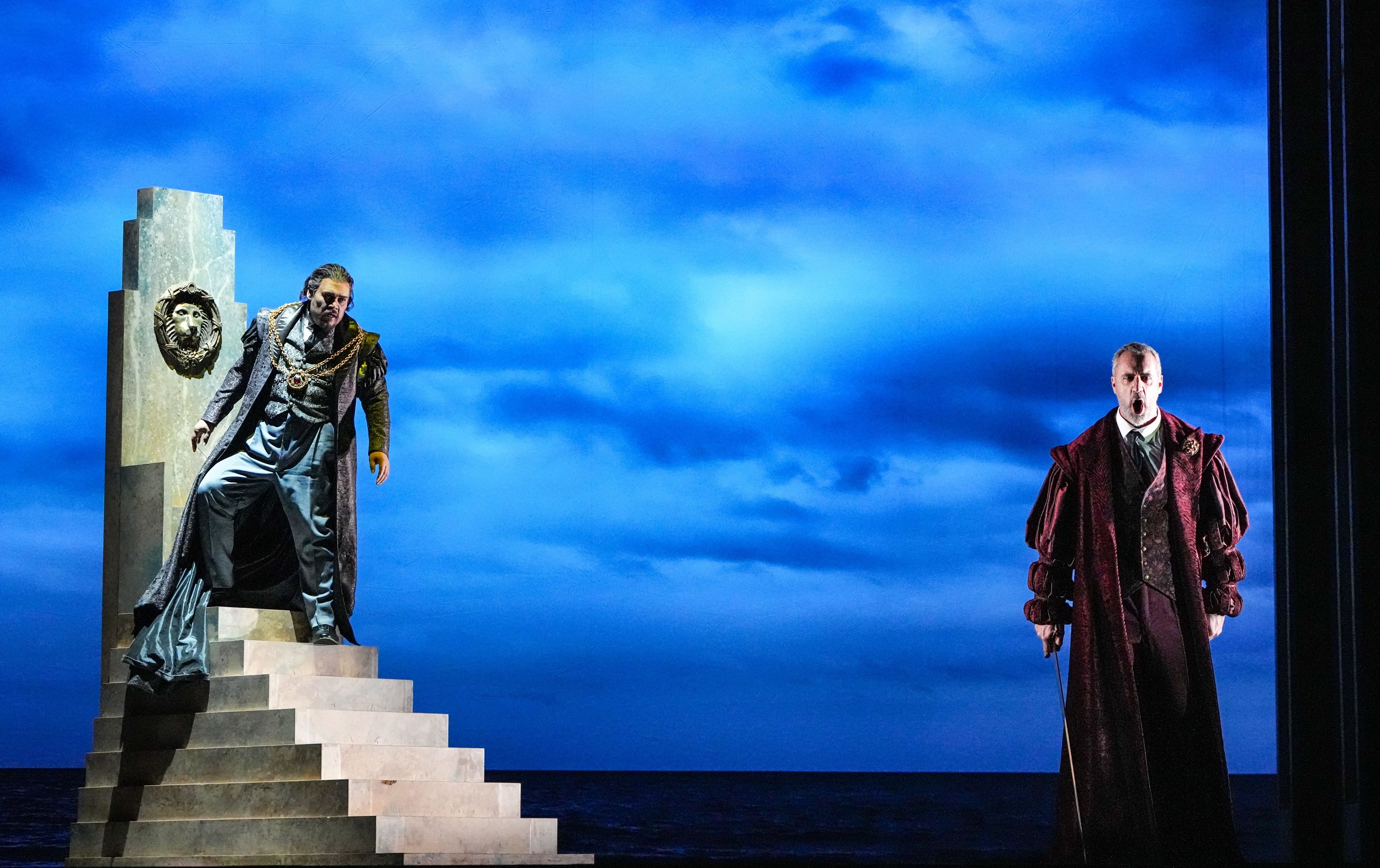Opera Philadelphia’s Festival O23 opened their new season by once again giving opera festivals a good name, full of freshness, innovation, fun, and quality. I was able to take in their three headliner events that will run for two weeks, along with many concerts and recitals. The headliner productions are the world premiere of 10 Days in Madhouse, a made fresh Verdi’s Simon Boccanegra (1881), and Unholy Wars, a different take on the crusades. Before I comment on the Verdi opera, let me give a tip of the hat to Opera Philadelphia for continuing to serve the opera community so richly with their annual fall festival.
Boccanegra (Quinn Kelsey) and Amelia (Anna María Martínez) discover that they are father and daughter. Photo by Steven Pisano; courtesy of Opera Philadelphia.
My expectations for Boccanegra were low. This Verdi opera from his middle period has been universally described as overly complicated, too sad, even unlovable, and it favors male voices as if that is a bad thing, supposedly an opera just for opera connoisseurs. We should have faith in Corrado Rovaris, Opera Philadelphia’s Music Director and Conductor who spearheaded the drive to perform this opera in the Academy of Music. We should also have faith in the ability of Opera Philadelphia to bring in top notch singers to bring these works to life. Yes, the plot for Boccanegra is overly complex for even a three-hour opera and requires some effort on the part of attendees, but the reward for this effort is great. This is a very good opera. Unfortunately for Verdi, he is the standard by which his operas are measured; keep in mind that merely good by Verdi places it in the better group of all operas in the canon. As performed by Opera Philadelphia on Friday night, it was a gem.
Boccanegra (Quinn Kelsey) has his ear bent by Paolo (Benjamin Taylor), the man who enabled his rise to DOGE. Photo by Steven Pisano; courtesy of Opera Philadelphia.
The plot, taken from a Spanish play by Antonio Garcia Gutiérrez of the same name, was first developed into an opera by Verdi with his long-time librettist Francesco Maria Piave. They had many hits, such as Rigoletto and La Traviata, but this one did not find favor with Italian audiences in 1857. Verdi himself played a strong role in developing the libretto and later concluded it was “too desolate, too sad”. Some twenty years later, his publisher Giulio Ricordi convinced him to revise the work as an entry step to working with a new librettist/composer Arrigo Boito (they then worked together to create Otello and Falstaff). Presumably, Verdi also agreed because he wanted to see wider distribution of his message supporting the Risorgimento, the unification of Italy. The revisions were viewed favorably, though at the time Boito did not want his name associated with the opera.
Boccanegra (Quinn Kelsey) tries to settle differences with Fiesco (Christian Van Horn). Photo by Steven Pisano; courtesy of Opera Philadelphia.
The plot is too detailed to cover adequately here; see the Fan Experience section below for a suggestion. I will mention several themes: the plebian (a commoner) Paolo, plots to have Simon Boccanegra, a corsair (a useful pirate), elected Doge of Genoa, so he can use him as a puppet to gain power and influence to pad his own pocket; it doesn’t work out so well for him as Boccanegra turns out to have an honorable streak, and Paolo plots his demise. Boccanegra is in love with and has borne a child with Maria, daughter of the patrician (a rich guy) Fiesco, who has a reputation to think of and is now really angry with our hero. Maria dies and the child, also named Maria, has been lost. Fast forward twenty-five years…Fiesco has adopted Maria, not knowing it is his granddaughter, and named her Amelia. He is also still plotting the overthrow of Boccanegra, now with Amelia’s great love, Adorno. There are also conflicts going on within rival groups in Genoa and between Genoa and Venice that Boccanegra tries to soothe and get everyone working together (composer’s message to Italians at the time). The complexity is interesting once you delve into it and likely would make a good mini-series. The mixing does interrupt the flow of the individual stories, but the opera has many potent scenes, perhaps the most powerful is when Boccanegra and Amelia discover they are father and daughter; it will bring tears to your eyes. I almost titled my report, “A Father’s Love is a Beautiful Thing”.
Adorno (Richard Trey Smagur) struggles with his feelings for Amelia. Photo by Steven Pisano; courtesy of Opera Philadelphia.
These powerful scenes are brought to life by an extraordinary cast of singers. OP brought back the pairing from 2021 who starred in their production of Tosca, abbreviated, and performed outdoors due to pandemic regulations as The Drama of Tosca. This was an inspired decision. Baritone Quinn Kelsey was as likable as the conflicted Doge as he was scary as Scarpia. Anna María Martínez was as compelling as Amelia/Maria as she was as Tosca. Both sang beautifully in both productions and were magic together, especially in the scene of their reuniting as father and daughter. They were well matched in the beauty of their voices, the precision and emotion of their singing, and believability of their characterizations by baritone Benjamin Taylor as Paolo, bass-baritone Christian Van Horn as Fiesco, tenor Richard Trey Smagur as Paolo, and base-baritone Cory McGee as Pietro, Paolo’s accomplice. This outstanding team were supported by a very strong performance by the Opera Philadelphia Chorus, led by Chorus Master Elizabeth Braden.
l to r: Pietro (Cory McGee), Amelia (Anna María), and Paolo (Benjamin Taylor). Photos by Steven Pisano; courtesy of Opera Philadelphia.
OP’s Simon Boccanegra is a new production, premiered in 2022 by Opéra Royal de Wallonie Liége. The set by designer Gary McCann was an impressive display of imposing geometric columns and walls placed on the stage floor’s rotating disc to move from scene to scene, clearly communicating the halls of power of the Doge and the isolated areas for intrigue. The performance was also enhanced by the lighting effects of John Bishop and the period costumes of 14th century Genoa by designer Fernand Ruiz. Director Laurence Dale used these elements well and kept the flow of the story moving, adding some especially dramatic staging with Boccanegra sitting alone, isolated at the top of a throne against a wind-swept landscape and the appearance of the original Maria’s ghost at the end. It was sad, and at times it was desolate, but Opera Philadelphia’s Boccanegra was also affecting and touchingly bittersweet.
The final confrontation between Simon Boccanegra (Quinn Kelsey) and Fiesco (Christian Van Horn). Photo by Steven Pisano; courtesy of Opera Philadelphia.
Musicologists tell us that this version of Simon Boccanegra was the beginning of Verdi’s maturation in moving from formulaic operas to a more realistic style, less show stopping arias and more recitative storytelling using dramatic music and the full orchestra in accompaniment, closer in style to Otello than Traviata. Kudos to Conductor Rovaris and the Opera Philadelphia Orchestra for the beautiful and highly dramatic music. It was Verdi after all, and great Verdi, per usual!
If your initial thought was similar to mine: I’m not sure I want to go see Simon Boccanegra. Be assured, this is a very good opera and this production of it is outstanding. Different eras tend to favor different artistic works. Maybe Simon Boccanegra’s time has come. Kudos to Opera Philadelphia for using its Festival O23 to bring us something old that feels new and will be new to many of us, and something that is really, really good.
The Fan Experience: Simon Boccanegra was scheduled for performances on September 22, 24, 29, October 1. The opera is sung in Italian with English translations projected overhead. Information and tickets can be accessed at this link
Opera Philadelphia has placed two helpful, short videos on Youtube, one giving an overview of the opera and its history by scholar in residence, Lily Kass, and another that presents a detailed synopsis of the opera in a clever and artistic fashion. These are less than nine minutes each and well worth a viewing.
Festival O23 continues through October 1. The two-week program can be viewed in its entirety at this link. I might also add that Philadelphia remains one of my favorite places to visit, offering so much in history, culture, entertainment, and great food!



